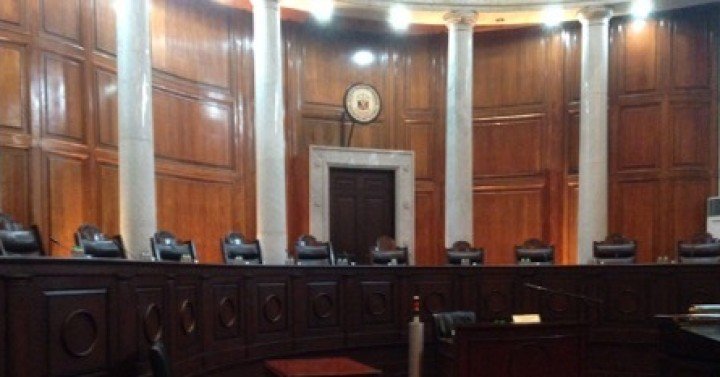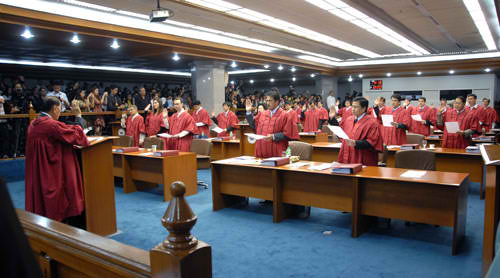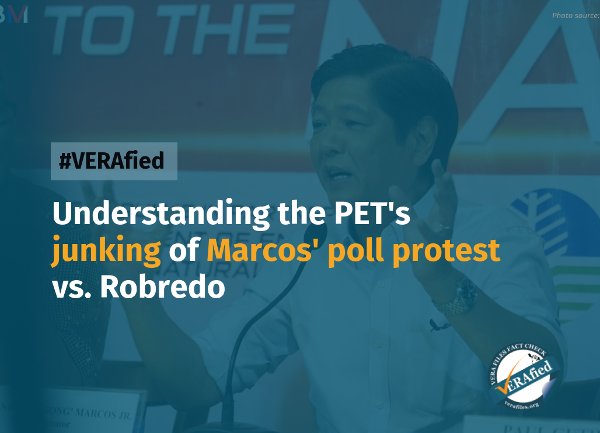The Supreme Court’s unanimous decision granting the full retirement benefits of the late chief justice Renato Corona, despite his impeachment in 2012, is quite unsettling. It sends the wrong signal to public officials that it is all right to be dishonest for as long as they serve at least 15 years in government.
Corona was ousted in highly divisive impeachment proceedings, putting the camps of then president Benigno “Noynoy”Aquino III and that of his predecessor, Gloria Macapagal-Arroyo, against each other with the Arroyo side accusing Aquino’s allies of using Corona as a political pawn to exact revenge and, at the same time, control the judiciary.
Why the High Tribunal’s resolution, dated Jan. 12, was made public only last Feb. 5 raises suspicion that it was timed on a weekend to temper any adverse reaction. News stories about it, however, came out four days later on Feb. 9.
Corona was removed as chief justice on May 29, 2012, following his impeachment by the House and subsequent conviction in a Senate trial for betrayal of public trust, primarily arising from his failure to declare some of his assets, including bank accounts and real estate properties, in his statement of assets, liabilities and net worth (SALN).
Consequently, Corona faced tax evasion charges, 32 criminal cases for perjury, 33 administrative complaints for violation of the Republic Act 6713 or the “Code of Conduct of Ethical Standards for Public Officials and Employees,” and a civil case for forfeiture that were filed at the Sandiganbayan in 2014. However, all of those cases were dismissed after he died on April 29, 2016.
Corona was deemed to have “involuntarily retired,” considering that his “judicial liability” was not established yet at the time of his death.
The Supreme Court’s Jan. 12 resolution came with a strong warning that the SALN of public officials should never be used as a “weapon for political vendetta.” It set aside the impeachment court’s decision, ousting the late chief justice, and considered heavily the appeal of Corona’s widow to allow her to receive the monthly pension and other financial gratuities accorded to the survivors of deceased justices and judges of the courts.
It implied that the issue involving Corona’s retirement benefits was no longer part of the judgment on the impeachment complaint, pointing out its limitation to “no further than removal from office and disqualification from holding any public office.”
In saying that SALNs should never be used as a tool for political vendetta, the justices have seemingly forgotten that Corona’s successor, Maria Lourdes Sereno, was ousted through an unprecedented vote of eight of her colleagues in a quo warranto petition initiated by Solicitor General Jose Calida and allies of President Rodrigo Duterte.
The 8-6 vote on the quo warranto petition ousted Sereno for her failure to submit some of her SALNs when she was still a law professor at the University of the Philippines several years prior to her appointment to the Supreme Court in Aug. 2012.
Sereno was an Aquino appointee and would have served as chief justice for 18 years until 2030 when she reaches the mandatory retirement age of 70. She would have deprived several senior justices of the opportunity to become chief justice.
The resolution in the Corona case clearly contrasts with the decision in Sereno’s quo warranto petition. It shows that it is fine to use the SALN as a tool to remove a colleague who gets in their way but not when it affects an ally.
A simplistic way of putting it is that it’s all about power and money, the perks and privileges. Sereno was an obstacle to the magistrates’ dream to retire as chief justice. By removing her, they got a fair chance not only to become chief justice, but also retire with a hefty financial package.
Granting Corona’s full retirement benefits, despite his impeachment, set a precedent that can be invoked when any of them are placed in a similar situation.
Is it then a case of misplaced compassion or selfish intentions?
It may be cited that the composition of the Supreme Court during the voting on the petition against Sereno and on the appeal of Corona’s widow was not the same. But then, it shows an inconsistency in decisions and policies in the highest court of the land, which is considered the final arbiter of the law to ensure delivery of fair and equal justice.
Associate Justice Ramon Paul Hernando, who penned the resolution allowing the release of Corona’s full retirement benefits to his widow, was not in the Supreme Court yet when Sereno was ousted in May 2018. Duterte appointed him to the tribunal five months later.
While the high court is correct in saying that the SALN is “a tool for public transparency, never a weapon for political vendetta,” its contradictory positions in the Corona and Sereno cases belie the strong message that it seeks to preach.
The issues involved failure to submit copies of the SALN in the case of Sereno and under declaration of wealth in his SALNs in the case of Corona. If Sereno was ousted because she was deemed unfit to head the judiciary for her failure to submit some of her SALNs, the Senate impeachment court had declared that Corona was also unfit to hold on to the position for an act of dishonesty in a public document.
After Corona was impeached, the Supreme Court restricted the release of SALNs, which was seen as a move to protect justices and judges from possible cases involving what is or what is not declared in their SALN.
In view of this, the high court turned down the request of the Solicitor General to have a copy of the SALNs of Associate Justice Marvic Leonen. Calida wanted access to Leonen’s SALN for a quo warranto petition to oust him for allegedly sitting on the electoral protest of former senator Ferdinand Marcos Jr. against Vice President Leni Robredo, an apparently legal approach in exacting a political vendetta.
Indeed, there are things that may be legal but not necessarily moral.
The views in this column are those of the author and do not necessarily reflect the views of VERA Files.
This column also appeared in The Manila Times.



